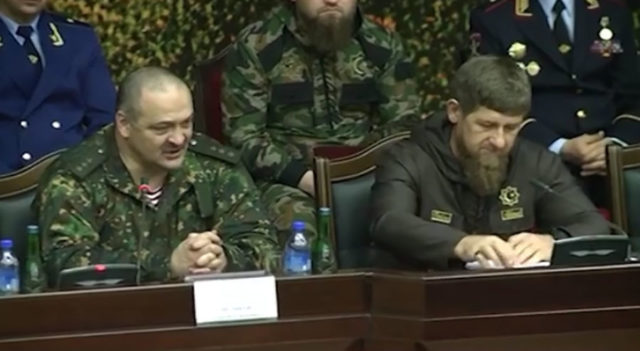
North Caucasians Feel the Pain of Russia’s Invasion of Ukraine
Publication: Eurasia Daily Monitor Volume: 19 Issue: 38
By:

Following the massive Russian re-invasion of Ukraine on February 24, several governors of the North Caucasian republics delivered bellicose statements. Chechnya’s ruler, Ramzan Kadyrov, stated that his 12,000 fighters were prepared to be deployed in Ukraine and carry out President Vladimir Putin’s orders (Vk.com/ramzan, February 25). The governor of North Ossetia, Sergei Menyailo, warned the West “not to wake up the Russian bear” (Osnova.ru, February 24). Dagestan’s Governor Sergei Melikov stated that Russia had all the necessary arms and manpower “to protect our common home” (President.e-dag.ru, February 24).
Soon, North Caucasian governors began making more somber reports of fallen compatriots in Ukraine. Melikov was the first among Russian governors to recognize losses in the war on February 27. As of March 15, Dagestan officially acknowledged the death of 29 servicemen in Ukraine. However, semiofficial reports put that number at 130 or more (Kavkaz.Realii, March 15). Sporadic publications of figures in Ingushetia and North Ossetia suggest significant losses in the small republics—8 and 14 servicemen, respectively (Kavkazsky Uzel, March 9, 12). These numbers likely represent only a fraction of the actual casualties in Dagestan. For example, an Ingush website, Fortanga, reported 12 deaths as early as March 3 (Fortanga, March 4). Russia’s Ministry of Defense announced the official number of 498 killed-in-action service members on March 2 (Kommersant, March 2). Since then, this number has not been updated. As of March 13, the Ukrainian government estimated Russian losses at over 12,000 and its own casualties at 1,300 (UNIAN, March 12). Ukrainian sources provided a list of captured Russian service members that includes, among others, people from Dagestan, Kabardino-Balkaria and North Ossetia (Ukrainskaya Pravda, March 4)
It is not a coincidence that the first official recognition of casualties appeared in the North Caucasian republics. While communities of ethnic Russians are highly fragmented with few horizontal ties, members of the North Caucasian societies are far more interlinked. For example, traditionally, North Caucasian funerals gather hundreds of people, including neighbors, colleagues, close and distant relatives. It is much harder for the government to control the flow of information in North Caucasian societies since news propagation depends less on electronic media and more on (non-electronic) social interactions.
After the failure of the Kremlin’s blitzkrieg in Ukraine, the Russian parliament quickly adopted punitive legislation against individuals who undermined the Russian invasion of Ukraine of up to 15 years in prison. Two young people received administrative arrests for staging an anti-war protest in Nalchik, Kabardino-Balkaria (Kavkazsky Uzel, March 2). A blogger from Prokhladny, Kabardino-Balkaria, also received administrative detention after “negative comments” about the Russian invasion of Ukraine (Kavkazsky Uzel, March 2). Many online users in Ingushetia have also reportedly spoken against the war (Fortanga, March 4). The situation in other republics remains relatively calm on the surface. However, as casualties keep mounting, it might change at any time.
Such a large number of casualties in such a short span of time is unprecedented for the Russian army in general and the North Caucasian servicemen in particular. Neither Russia nor the Soviet Union has attacked a large country the size of Ukraine since World War II. If the war grinds on, of which there are strong indications, the casualties will add up even higher and start affecting the public mood in the North Caucasus more profoundly. The fundamental difference between the outlook of North Caucasians and ethnic Russians is that the former do not necessarily share the ideas and goals of the latter concerning Russia’s expansion. For the ethnic Russians, expansionism is about the restoration of Russian power often understood in ethnic terms, hence the notion of “Russkiy Mir” (“Russian World”). Ethnic non-Russians cannot fully share Russians’ enthusiasm, even though many have bought into the Russian propaganda of fighting “Nazis” in Ukraine. For example, Ukrainian government sources report that the Kadyrovtsy (Chechen forces allegiant to Ramzan Kadyrov) treat the Ukrainians under occupation significantly better than ethnic Russian occupiers (YouTube, March 12). As the costs of the invasion climb, people across Russia, including the North Caucasus, will inevitably start asking questions about the necessity of the war.
Besides the direct military costs of the invasion, economic costs will soon start kicking in. Prices for many everyday commodities have risen in the North Caucasian republics. People in the region are particularly vulnerable because they are significantly worse off than the average region of Russia due to the long-term problem with insufficient investment by Moscow. The projected slump in government revenues may hit the North Caucasian republics particularly hard because they are so dependent on subsidies from the central government in Moscow. In fact, a large part of Moscow’s success in suppressing the homegrown insurgency in the region was owed to a massive increase in subsidies. For example, the ruler of Chechnya, Ramzan Kadyrov, boasted about receiving 300 billion rubles (approximately $4 billion) from Moscow during the previous year (Moskva24, January 24). This is a very significant amount of money for Russia in its current downward economic spiral. If the cash flows from Moscow to the North Caucasian republics dry up, it will create a shock with consequences that are difficult to predict. While it is hard to expect an impending rebellion in the region at this time, if the Kremlin falters as a result of the disastrous attack on Ukraine, it will have serious repercussions for Russian power in the North Caucasus.



